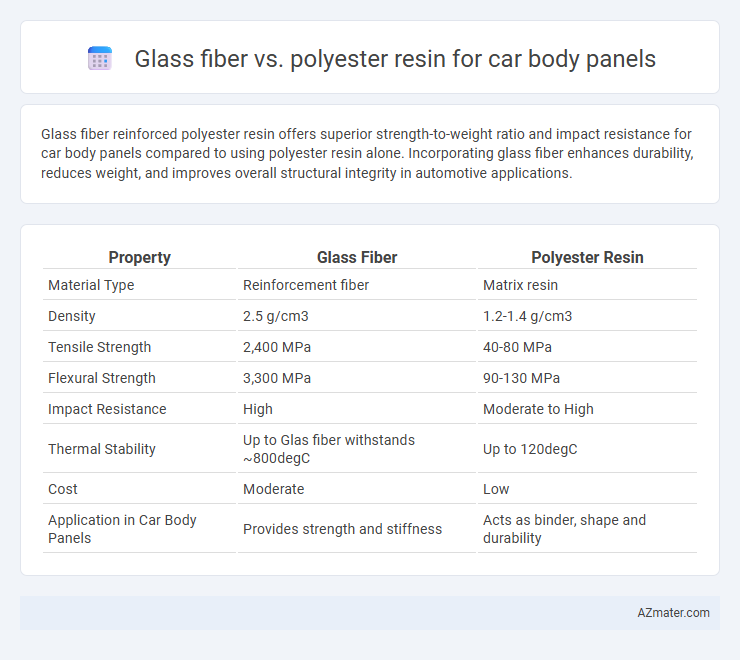Glass fiber reinforced polyester resin offers superior strength-to-weight ratio and impact resistance for car body panels compared to using polyester resin alone. Incorporating glass fiber enhances durability, reduces weight, and improves overall structural integrity in automotive applications.
Table of Comparison
| Property | Glass Fiber | Polyester Resin |
|---|---|---|
| Material Type | Reinforcement fiber | Matrix resin |
| Density | 2.5 g/cm3 | 1.2-1.4 g/cm3 |
| Tensile Strength | 2,400 MPa | 40-80 MPa |
| Flexural Strength | 3,300 MPa | 90-130 MPa |
| Impact Resistance | High | Moderate to High |
| Thermal Stability | Up to Glas fiber withstands ~800degC | Up to 120degC |
| Cost | Moderate | Low |
| Application in Car Body Panels | Provides strength and stiffness | Acts as binder, shape and durability |
Introduction to Car Body Panel Materials
Glass fiber combined with polyester resin is a prevalent composite material used in car body panels due to its high strength-to-weight ratio, corrosion resistance, and cost-effectiveness. Polyester resin acts as a matrix binding the glass fibers, providing structural rigidity and durability while maintaining flexibility during impact. This composite offers superior performance compared to traditional materials like steel or aluminum, enhancing vehicle fuel efficiency and design versatility.
Overview of Glass Fiber
Glass fiber, a high-strength reinforcement material, is widely used in car body panels for its excellent tensile strength and durability compared to polyester resin alone. It enhances structural integrity and impact resistance, making panels lighter and more resistant to deformation under stress. Glass fiber composites also improve corrosion resistance and offer superior dimensional stability, vital for automotive applications demanding long-term performance.
Overview of Polyester Resin
Polyester resin is a widely used thermosetting polymer in automotive composite manufacturing due to its cost-effectiveness, ease of curing, and strong adhesive properties with glass fiber matting. This resin offers high mechanical strength and good resistance to water and chemicals, making it suitable for car body panels requiring durability and light weight. However, polyester resin has lower impact resistance and flexibility compared to other resins like epoxy, which can affect long-term performance in high-stress automotive applications.
Strength and Durability Comparison
Glass fiber reinforced polyester resin offers superior tensile strength and impact resistance compared to standard polyester resin, making it ideal for car body panels subjected to stress and collision. The composite structure of glass fiber enhances durability by providing excellent resistance to environmental factors such as moisture, UV radiation, and temperature fluctuations. Polyester resin alone tends to be more brittle and less resilient, resulting in lower long-term durability and increased risk of cracking or degradation under mechanical and environmental stress.
Weight Differences and Impact on Performance
Glass fiber reinforced polyester resin car body panels typically weigh less than traditional steel panels, contributing to improved fuel efficiency and vehicle handling. The lower density of glass fiber composites reduces overall weight without compromising strength, enhancing acceleration and braking performance. This weight advantage also improves suspension dynamics and reduces wear on tires and brakes, leading to better long-term durability.
Cost Analysis: Glass Fiber vs Polyester Resin
Glass fiber car body panels typically incur higher initial material costs compared to polyester resin due to the specialized manufacturing processes and raw fiber expenses. Polyester resin is more cost-effective, offering lower material and production expenses, which makes it a preferred choice for budget-sensitive automotive applications. However, the long-term durability and strength of glass fiber may reduce maintenance costs, potentially offsetting its higher upfront investment.
Ease of Manufacturing and Repair
Glass fiber combined with polyester resin offers excellent ease of manufacturing for car body panels due to its lightweight nature and moldability, allowing for complex shapes and rapid production through processes like hand lay-up and spray-up. Repairing polyester resin panels reinforced with glass fiber is relatively straightforward, involving sanding, application of compatible resin, and fiberglass patching, which ensures timely restoration without compromising structural integrity. Compared to other materials, the balance of flexibility and strength in glass fiber-polyester composites reduces labor costs and downtime in both manufacturing and repair stages.
Weather and Chemical Resistance
Glass fiber reinforced polyester resin offers superior weather resistance compared to traditional polyester resin, providing enhanced durability against UV radiation and moisture exposure. The combination of glass fiber and polyester resin results in improved chemical resistance, effectively protecting car body panels from automotive fluids, salt, and environmental pollutants. This composite material maintains structural integrity and aesthetic quality in harsh weather conditions, making it ideal for exterior automotive applications.
Common Applications in Automotive Industry
Glass fiber reinforced polyester resin is extensively used in automotive body panels due to its excellent strength-to-weight ratio, corrosion resistance, and cost-effectiveness. Common applications include exterior panels such as fenders, hoods, and roof skins, where durability and impact resistance are critical. The combination of glass fiber and polyester resin also allows for complex shapes and lightweight components, enhancing vehicle performance and fuel efficiency.
Choosing the Best Material for Car Body Panels
Glass fiber reinforced polyester resin offers high strength-to-weight ratio and excellent durability, making it a top choice for car body panels that require impact resistance and corrosion protection. Polyester resin alone is less rigid and prone to cracking under stress, which limits its use without reinforcement. Selecting glass fiber composite materials enhances structural integrity and longevity, improving overall vehicle performance and safety.

Infographic: Glass fiber vs Polyester resin for Car body panel
 azmater.com
azmater.com